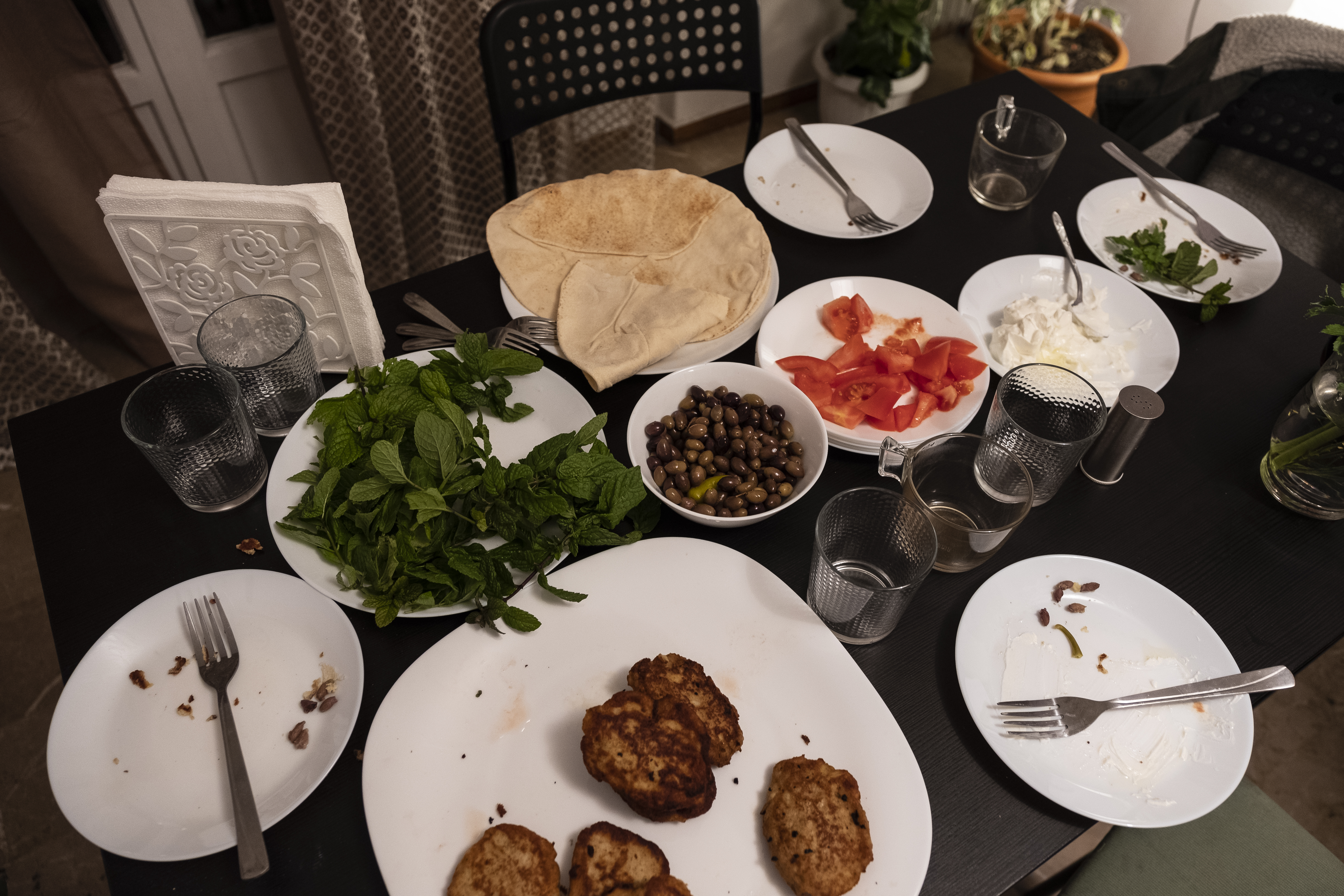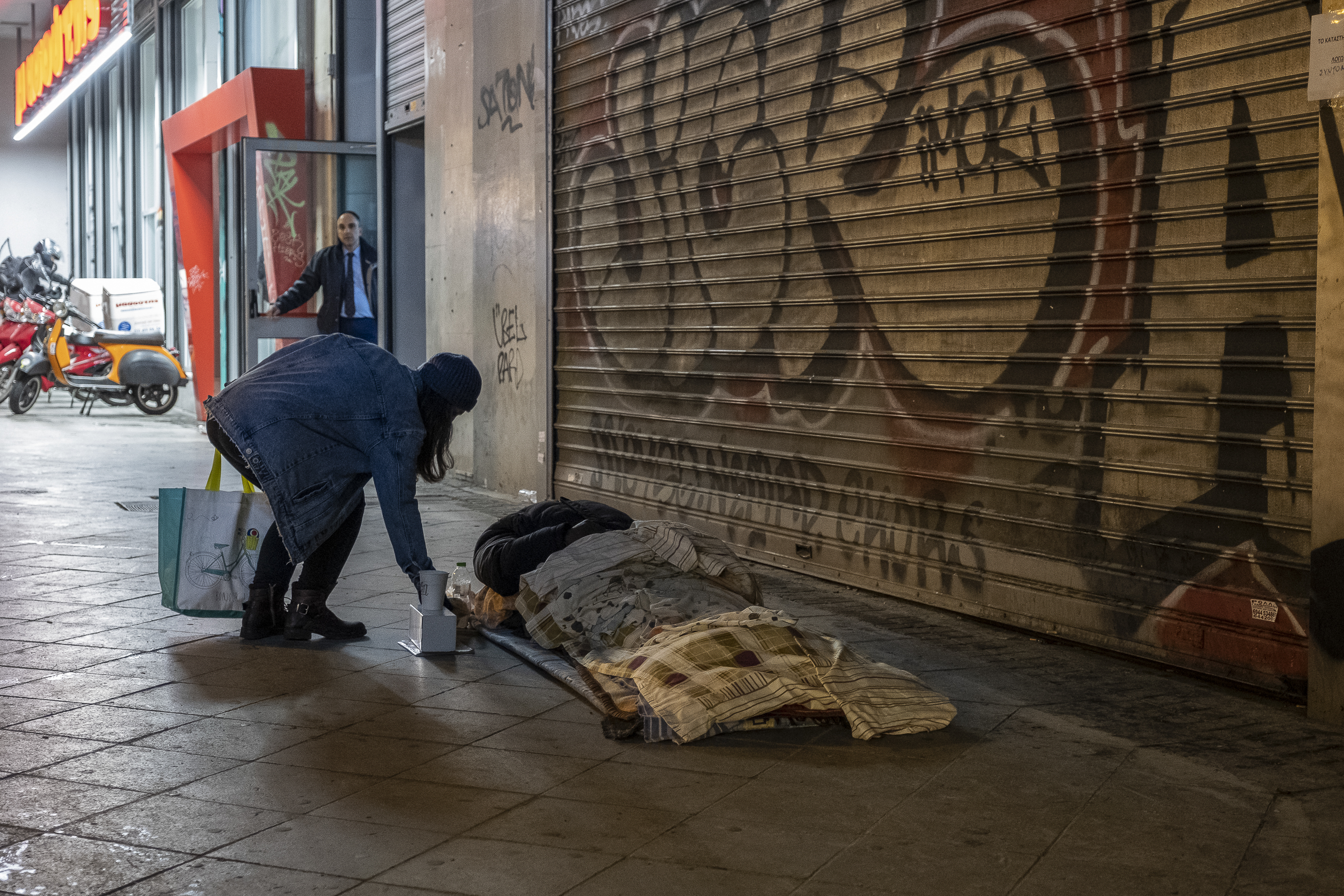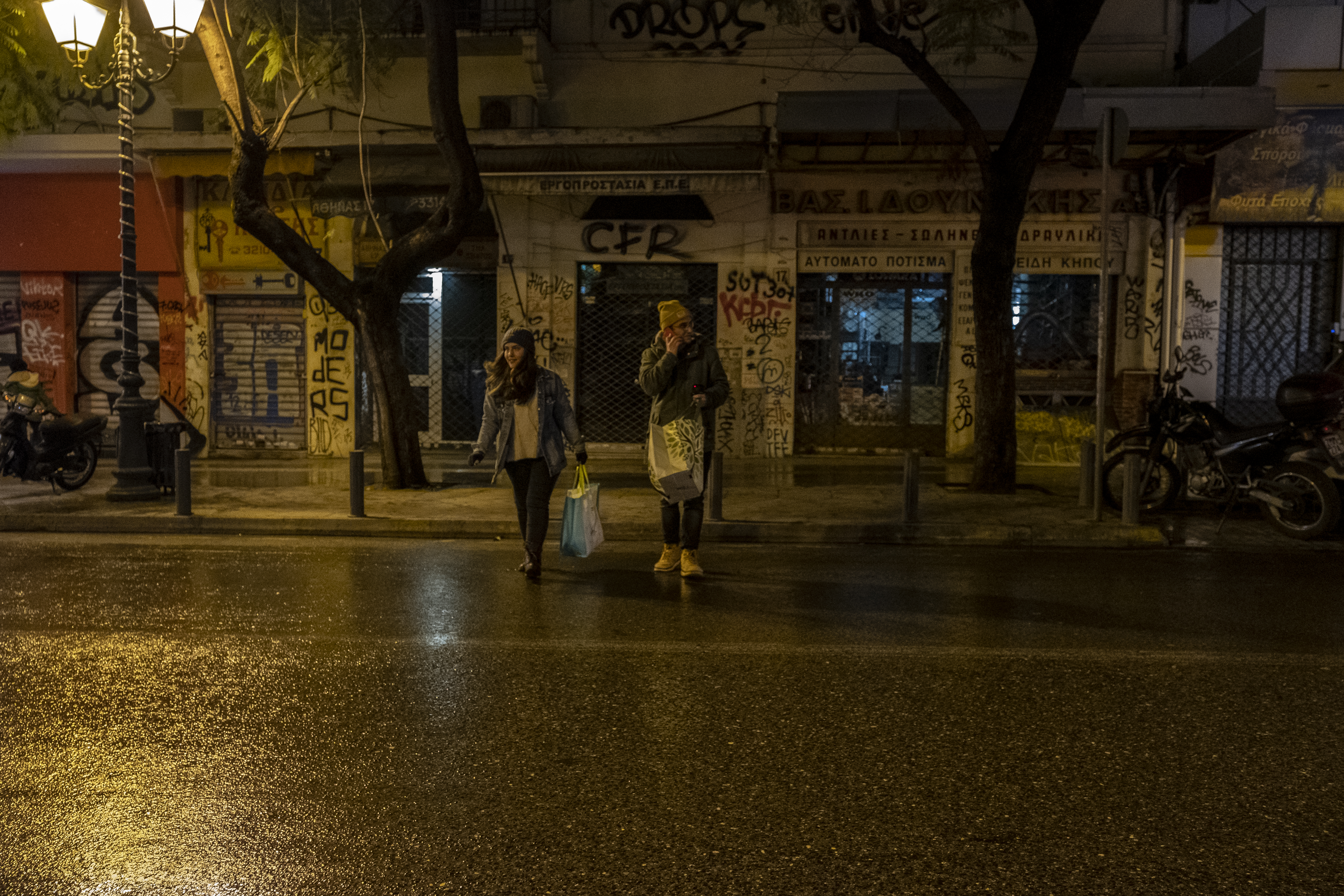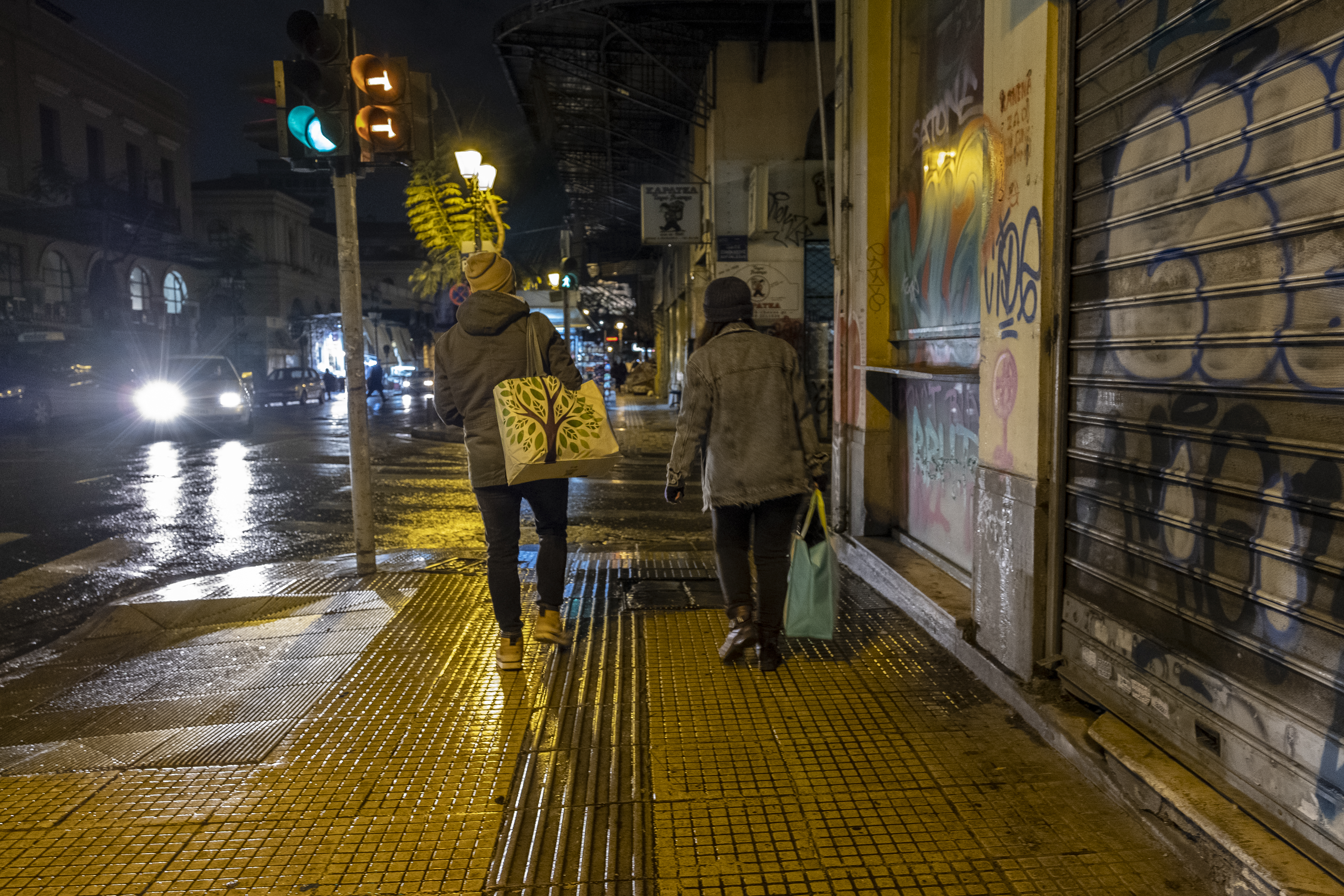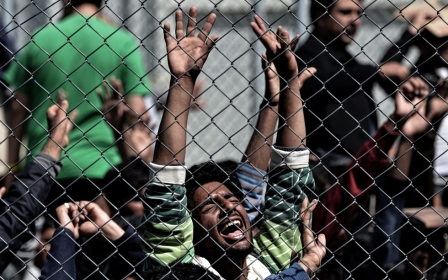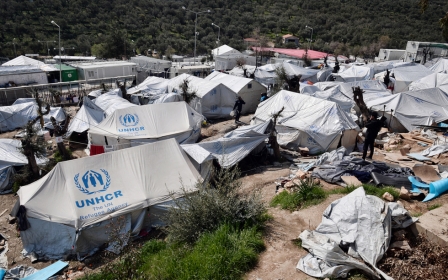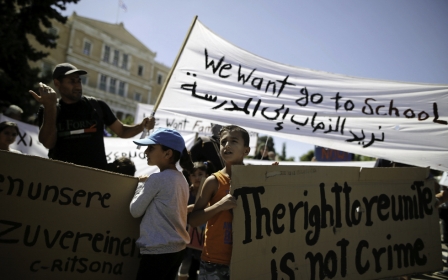She arrived with nothing. Now this Iranian woman feeds Athens' homeless
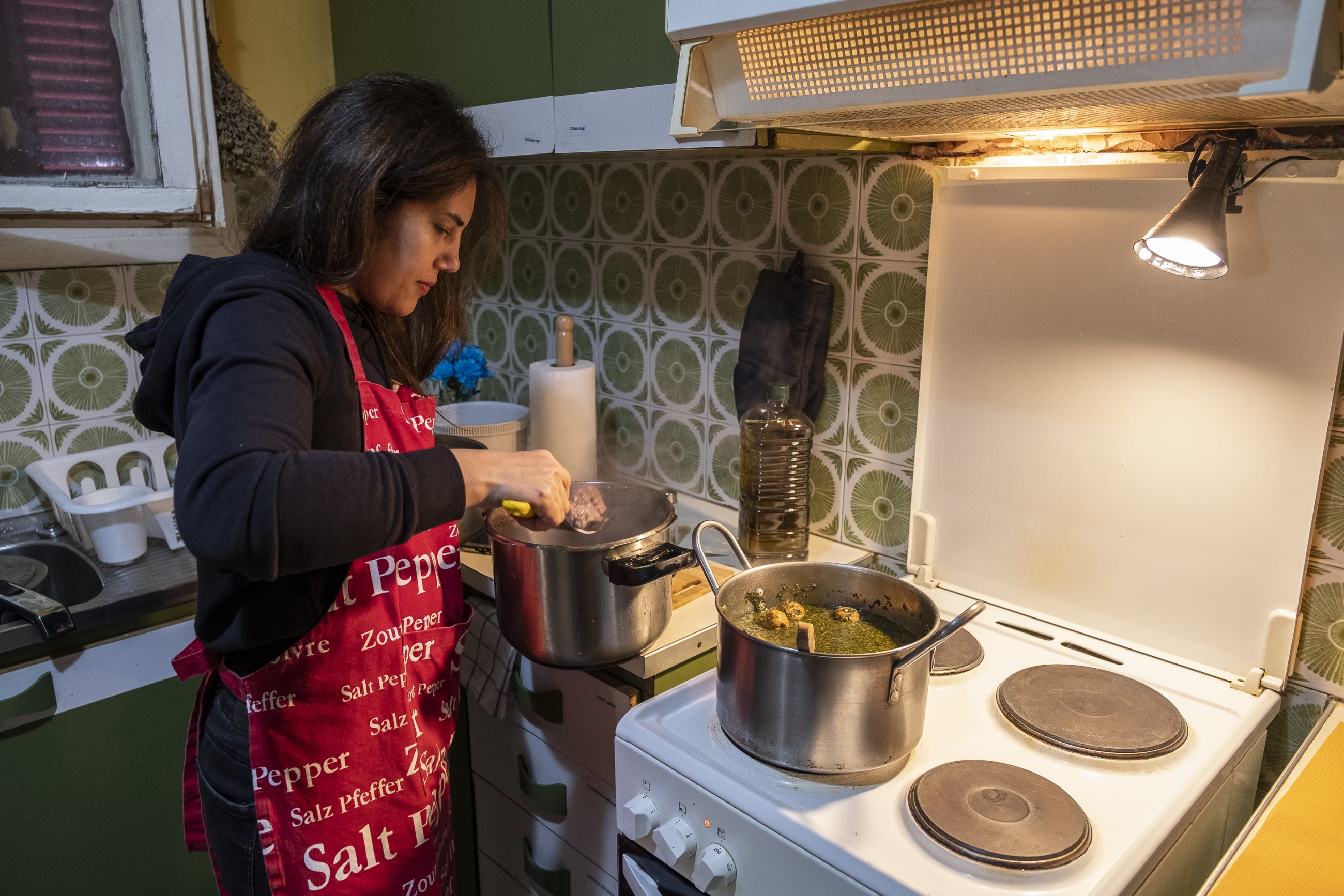
Leaning over the simmering pot of ghormez sabzi - an Iranian dish of pureed dark green vegetables, chunks of meat and typical Iranian spices - Mahboubeh Tavakoli, 33, removes the lid and closes her eyes.
As the fragrant steam rises, she inhales deeply. It’s nearly ready. Quickly placing the lid back on the pot, she lowers the heat and turns her attention to an even larger pot full of rice sitting on a back burner.
Today, Tavakoli is making lunch for a dozen unaccompanied minor girls, asylum seekers under the age of 18 who have arrived in Greece alone.
After she finishes with the lunch, she will begin making their dinner before leaving the shelter to attend English and Greek language classes and an art therapy workshop at the Melissa Network, a centre for migrant women in Greece only ten minutes down the street.
New MEE newsletter: Jerusalem Dispatch
Sign up to get the latest insights and analysis on Israel-Palestine, alongside Turkey Unpacked and other MEE newsletters
Every Monday to Thursday, from 9am to 1pm, Tavakoli works as a cook in a shelter for unaccompanied minors. But this is only her day job.
Several nights a week, Tavakoli prepares home-cooked meals for between 20 and 50 homeless people on the streets of Athens, depending on how much money she’s able to gather together that week. It is an initiative she started not too long after leaving the streets herself.
Living rough
Due to family issues and other reasons she prefers not to mention, Tavakoli and her husband were forced to flee Iran, leaving behind everyone and everything. Greece was their first and only stop.
When Tavakoli and her husband first arrived in Athens during the winter of 2016, they too were homeless. Like dozens of other asylum seekers, they slept out in the open in Victoria Park, a popular gathering place for recent arrivals. It was there that Tavakoli first got her inspiration to one day feed the homeless.
During the time she and her husband slept rough, a team of volunteers from a local church would come daily to distribute food to them and the dozens of other homeless asylum seekers and migrants in the park.
“We saw that the team was giving food to the homeless people and we thought that maybe we could do this too,” says Tavakoli.
Giving back
'We saw that the team was giving food to the homeless people and we thought that maybe we could do this too'
- Mahboubeh Tavakoli
Since 2015, images of over 1 million asylum seekers and migrants from the Middle East and North Africa making their way by boat to Europe’s doorstep have flooded our TVs, laptops and smartphones.
Fleeing war, persecution and economic devastation, most have braved a dangerous sea journey, entering the region through Greece or Italy. But an unstable economy has left few wanting to build a new life in Greece, and many find a way to move on, legally or otherwise.
Those who remain in Greece face the daunting task of finding a way to support themselves in an economy crippled by a ten-year financial crisis.
Despite their struggle and lack of stable work, an increasing number of refugees are turning to community service, giving back to a society they say has helped them in their greatest time of need.
Once Tavakoli’s asylum claim was processed and she and her husband were placed in UNHCR housing, it didn’t take long for her to turn her attention to community service. Three years later, she says, “it became a part of my life because I’ve been doing it for so many years now.”
Money and time
But because Tavakoli depends on donations from friends and other humanitarian organisations in Athens, the money flow is not always consistent. Some weeks, when the money is really low, she’s unable to cook at all. “Sometimes, when I’m eating food without giving anything to the homeless people outside, I feel really bad, like I’m missing something that day.”
Furthermore, since acquiring her part-time job, she lacks the time she once had to allocate to this initiative. “Before I started working, I was cooking every day with some friends I have from a church. Then I found a job, so I don’t have that much time, so now I’m doing mostly once a week,” she explains.
On a recent night in February in the kitchen of her apartment in the centre of Athens, Tavakoli stands elbow-deep in dinner preparations for two dozen homeless people. She lives in a multistory apartment building on a busy street in a neighbourhood that is popular with refugees and migrants, many of whom are homeless and will enjoy the meal Tavakoli is making.
Several frying pans of kookoosibzamani - small golden potato and egg patties - sit sizzling on the stovetop, while Tavakoli chops tomatoes and fresh oranges. The counters are scattered with jars of spices, olives and pickled vegetables, and several bags of flat, wide pita bread lay unsealed and ready.
When the kookoosibzamini are sufficiently golden-brown, she gently wraps two to three patties in a piece of pita bread with fresh mint leaves and sliced tomato. Then she puts one sandwich and some sliced oranges in a plastic bag and ties a knot on it. Tonight, she has prepared two dozen of these little dinner bags.
Before heading out to the streets for the night, Tavakoli insists on sampling her kookosenzamani first. She has already set the table with an array of side dishes and condiments including a plateful of fresh mint, pickled cucumbers, peppers and carrots, tiny glistening raisin-sized olives, thin flat pita bread and a bowl of thick Greek yoghurt drizzled with dark green olive oil.
And the star of the meal: a plate piled high with fresh kookosibzamini.
“It feels like home here for me, for us actually, because we started a new life here after we lost everything,” Tavakoli explains over dinner. “Greece gave us a new life, so that’s why we feel like it’s home.”
Tastes like home
"[Eating] ghorme sabzi reminds me of when I used to sit at home after coming home from school and my mum would cook and bring it for me to eat'
- Samira, 16, refugee
Samira, 16, an Afghan refugee born in Iran, lives with her older sister in the shelter for unaccompanied minors where Tavakoli cooks. The sisters arrived in Greece together in late summer of 2018.
Samira's favourite food that Tavakoli cooks is ghorme sabzi, "because it reminds me of when I used to sit at home after coming home from school and my mum would cook and bring it for me to eat."
When asked about living alone without her parents, she replied: "it's difficult, but we have to stand on our feet. I had many good memories [of home], but now I don't remember [them]."
Samira also does theatre workshops with Mahbouleh, who plays the role of her mother.
"Living here is living like a robot. Class, home. Class, home," Samira says. For girls like her, having a mother figure in the absence of their own mothers, is important. "Mahboubeh is my mother [here]," she says.
Unforgotten hardship
Out on the streets of Athens, Tavakoli slings a large shopping bag full of the food she has just prepared and some general hygiene items like toothbrushes and deodorant over her shoulder. Methodically, she makes her way down the street searching the nooks and dark corners where she knows the homeless tend to sleep.
As the hours pass and her bag becomes lighter, Tavakoli explains why it’s so important for her to feed the homeless. “I also experienced the same thing while we were on our way here,” she says. “We were sleeping on the roads and in the jungle and then we came here and slept in the park. So we experienced how it is to be homeless or hungry, so that’s why I believe that now is the time that I can help other people.”
Like hundreds of thousands of asylum seekers before her, Tavakoli endured endless hardships to reach European soil. She doesn’t talk about it in much detail, but the trauma of what she has experienced is visible in the tears that keep welling up in her eyes and threatening to spill over.
Now, she explains, having found peace and safety in Greece, she feels the need to give back to a society that helped give her a new life.
Empowerment and integration
According to Nadina Christopoulou, director of the Melissa Network, “cases like Mahboubeh’s illustrate the fact that no matter how deep the trauma, no matter how difficult the challenges are, the moment you start thinking of yourself as able to provide help to others, or to start sharing, because it’s all about the culture of sharing, then that is the decisive moment, the pivotal moment, of empowerment and integration."
Christopoulou continues: “We are talking about the process of the person being able to contribute back to society and Mahboubeh’s argument is always, ‘we’ve been welcomed by the locals; we’ve been hosted in this society, and this is our time to give back, this is our time to contribute’.”
For these reasons, it does not surprise Christopoulou that Tavakoli and others like her have so quickly turned to community service and to helping out those who are in even greater need than themselves.
“It’s so much more beyond just the healing process. It’s also a way to justify why they have sacrificed so much to move away from their homes,” Christopoulou emphasises. “It’s so important to be able to see themselves in a position of doing things that are meaningful, fertile, creative and supportive - that they are weaving something new as opposed to just waiting for a better opportunity.”
At the moment, Tavakoli can only donate her time and dinner once or twice a week, but her ambitions are much bigger. “Right now I can help them and give them some food or whatever I have,” she says.
“But, at the same time, I’m struggling about how I can help them more or how I can do something different for them, not just giving them food, but giving them something more - dignity or something for their future.”
Middle East Eye delivers independent and unrivalled coverage and analysis of the Middle East, North Africa and beyond. To learn more about republishing this content and the associated fees, please fill out this form. More about MEE can be found here.


